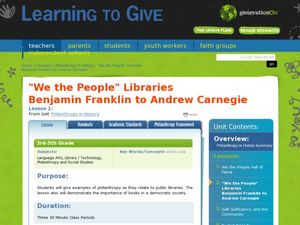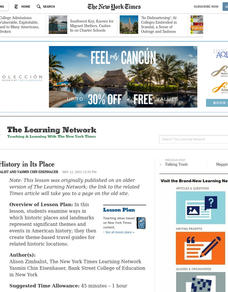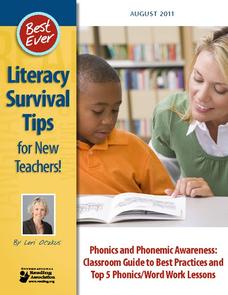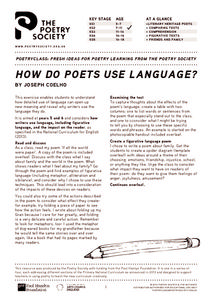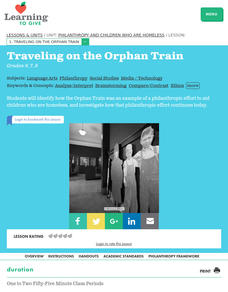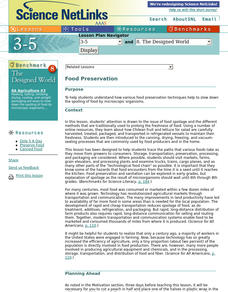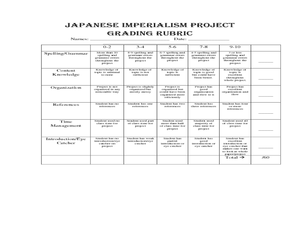Curated OER
Philanthropy in History
Students understand the importance of books in past and present societies. In this philanthropic lesson, students compare Andrew Carnegie and Benjamin Franklin's perspective on the importance of everyone being able to read. Students...
Curated OER
Putting History in its Place
Examine ways in which historic places and landmarks represent significant themes and events in American history. Then create theme-based travel guides for related historic locations. This lesson plan requires informational reference...
Curated OER
Using the Internet to Do Punnett Squares
What a fun way to explore Mendelian Genetics! Using a computer connected to the Internet, beginning biologists construct and use Punnett squares of monohybrid crosses to explain how genetic traits are passed to offspring. Other websites...
Curated OER
A New Era for Palestinians
Get a global perspective and examine the challenges facing Mahmoud Abbas, the newly elected president of the Palestinian Authority. Thoughtful classroom citizens write letters to Mr. Abbas, asking him questions and suggesting advice....
Curated OER
Is That a Fact?
Investigate popular scientific claims and gather evidence to defend or argue against an author's stance. Writers synthesize information and compose their own "Really?" columns modeled after those found in the weekly "Science Times"...
Curated OER
Citizens of the Future
Young sociologists explore how local, state, and federal governments work. This very impressive and ambitious lesson requires pupils to contact government officials who represent them and their families. They research elections, and hold...
IBM
What Path Will You Follow?
"What do you want to be when you grow up?" is a question every kid has to answer quite often. Here is a instructional activity that will allow them to do some thinking about that very topic, and to learn about some professions they might...
Curated OER
Introduction to Canada
Ninth graders investigate the country of Canada by examining their media in this geography lesson. They use the Internet to research Canadian newspapers and analyze a topic covered by both US and Canadian media sources. After comparing...
International Reading Association
Literacy Survival Tips for New Teachers!
Whether new to teaching or a seasoned pro, this 12-page phonics and phonemic awareness guide is a must for your curriculum library. Everything from a summary of research on the topic to exercises and activities is included.
Discovery Education
Mood Music!
Grouchy? Sad? Here's a great resource that shows kids how music can be used to lift their spirits. Kids collect and chart data on the effects of music on emotions. After analyzing the results of their experiment, they develop their own...
Perkins School for the Blind
Accessible Labels
When you're blind it is extremely important to be able to navigate your environment in as independent a way as possible. This idea isn't a lesson plan, but it is a great way to foster independent mobility and literacy skills while making...
Poetry Society
How do Poets Use Language?
Why do writers choose the language they do? Here's a resource that has the poet himself answer that very question. Joseph Coelho explains why he chose the words and images he used in his poem, "If All the World Were Paper."
Curated OER
Philanthropy And Children Who Are Homeless Lesson 1: Traveling on the Orphan Train
Students research how the Orphan Train was an example of philanthropy that was aimed at aiding homeless children. They determine how this philanthropic effort continues now by researching contemporary relief agencies. They participate in...
Curated OER
Philanthropic Literature Lesson 1: The Lonely Fish
Students investigate the concepts of sharing and good citizenship, and how they contribute to a peaceful society. They work on problem solving and critical thinking skills after listening to Marcus Pfister's, The Rainbow Fish.
Curated OER
Our Constitutional Connection Lesson 3: To Vote Or Not To Vote? That is the Question!
Students design colorful posters to "get out and vote" after studying the three amendments to the US Constitution that extend voting rights. They analyze the importance of voting to a healthy democracy.
Curated OER
A Colony is Born : Lesson 6 -To Leave or Not to Leave
Fifth graders connect reasons for coming to the New World with identity. The create identities and place them in one of three settled regions. They refer to prior study notes in their Colonial Notebooks to establish their identities.
Facing History and Ourselves
Eyes on the Prize Lesson 1: The Philosophy of Nonviolence
Learners explore the concept of nonviolent demonstration. In this Civil Rights Movement activity, students investigate examples of injustice and discuss the philosophy of nonviolence fueled by leaders of the movement. Learners apply...
Curated OER
History - Great Americans Lesson Plan
Students select and read biographies of great Americans, and develop four-paragraph reports on how these Americans contributed to our country.
Curated OER
Small Steps; Great Journeys
Twelfth graders examine contributions to communities. In this philanthropy lesson, 12th graders discuss the quote, "That's one small step for man, one giant leap for mankind." Students identify issues that exist in their community and...
Curated OER
Sorting
Students explore how books are sorted in a library. In this sorting lesson, students play a game where they have to fill the shelves with books that share a common theme. Students compare this game to a real library. Students discuss how...
Curated OER
Sorting
Students explore indexing by participating in a library book search. In this sorting lesson, students complete a "flood game" on the Internet and discuss the techniques of locating books in a library. Students locate specific titles in...
Curated OER
Coastal Ecology of the Bahamas
Sixth graders investigate the Bahamas through presentations and charts. In this ecology lesson, 6th graders utilize their library and Internet to research the life forms and species that inhabit the Bahamas. Students observe a...
Curated OER
Sorting
Students sort class books into categories to help classify and organize them so they are easier to find. In this sorting lesson plan, students go to the library and see how they organize their books and do the same in the classroom.
Curated OER
The Japanese Empire: The Beginning
Ninth graders explore empires by researching Japan's history. For this Japanese research lesson, 9th graders discuss the history of Japan and the elements of World War II that caused Japan to become an enemy of the United States....
Other popular searches
- Fifth Grade Library Lessons
- Library Lessons K 2
- Elementary Library Lessons
- Library Lessons & November
- Kindergarten Library Lessons
- Library Lessons Grade
- Library Lessons for Preps
- Halloween Lessons Library
- Teks Library Lessons
- Library Lessons on Blogs
- Third Grade Library Lessons
- Library Lessons Grade 7


